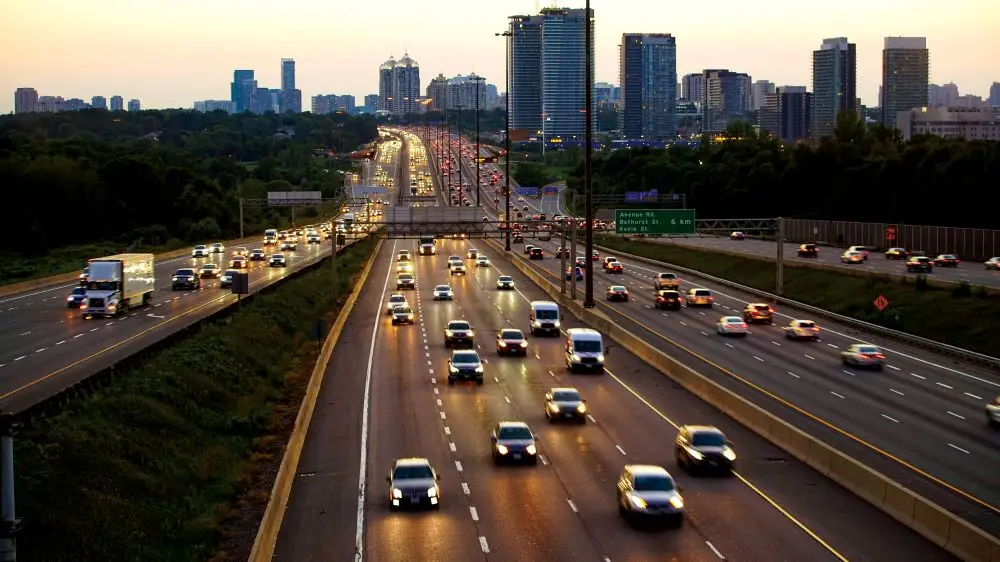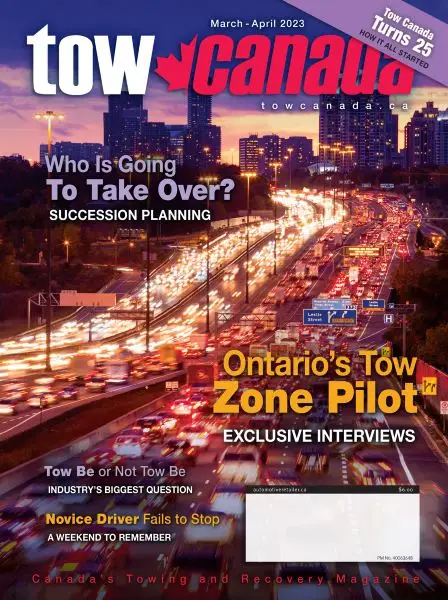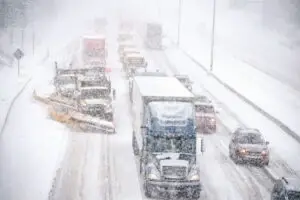Tow Canada speaks to representatives from the Ministry of Transport (Ontario), the Ontario Provincial Police, the towing industry, and an insurance company about the Tow Zone Pilot program, its progress, and its future.
by Kara Cunningham
In the previous article, Traffic, Turf-wars, and the Tow Zone Pilot (Part I), Tow Canada investigated the origins and goals of the Tow Zone Pilot (TZP) program. The program designates portions of the highway network within the Greater Toronto Area as Restricted Towing Zones (RTZ), and only designated Towing Services Providers (TSPs) may provide towing services within the restricted zones. The program is now over a year old, and the program’s various stakeholders are in the process of evaluating the program for year two and beyond.
Tow Canada has had the opportunity to communicate with representatives from the Ministry of Transportation (MTO), the Ontario Provincial Police (OPP), the TSPs, and an insurance company about the program. Initially, Tow Canada interviewed Eric Doidge, assistant deputy minister, operations division, Ontario Ministry of Transportation.
Eric Doidge, Assistant Deputy Minister, MTO, Operations Division
Tow Canada (TC): What led to the creation of the Tow Zone Pilot (TZP) program?
Eric Doidge (ED): Major freeway collisions involving commercial and passenger vehicles can result in closures and significant delays in the Greater Toronto Area (GTA), and in other urban areas.
In 2018, the Quick Clearance Committee (QCC) made up of MTO, OPP, and industry stakeholders was formed in response to several major commercial vehicle incidents where freeways remained closed for extended periods of time and concerns were voiced by the towing and trucking industry. The QCC reviewed options and proposed a Tow Zone Pilot (TZP) to reduce the time it takes to clear incidents and to address several other concerns in the towing industry.
In 2020, the province established a Towing Task Force in response to growing violence, corruption, and criminal activity in the towing industry. The task force made several recommendations including the establishment of the TZP as an immediate measure.
The pilot commenced on December 13, 2021, and introduced restricted towing zones on sections of provincial freeways within the GTA where only authorized towing companies can perform towing services in these zones.
TC: What is the goal of the program?
ED: The goal of the pilot is to enhance public safety, improve customer protections, and reduce clearance times on some of the busiest highways in North America. It is also intended to support the development of processes, standards, and the regulatory framework for the towing and storage sector. Providing towing and recovery services on high-speed provincial highways can be dangerous. Therefore, the TZP includes requirements that ensure that towing companies have proper equipment, training, and experience to perform towing and recovery services safely and efficiently.
Together, the TZP and other towing related initiatives are expected to enhance safety, improve customer protection, curb unethical practices, crack down on the bad actors in the industry, and support legitimate towing companies.
"The primary goal is to ensure public safety, customer protection, and faster and safer clearance on high-speed freeways.”
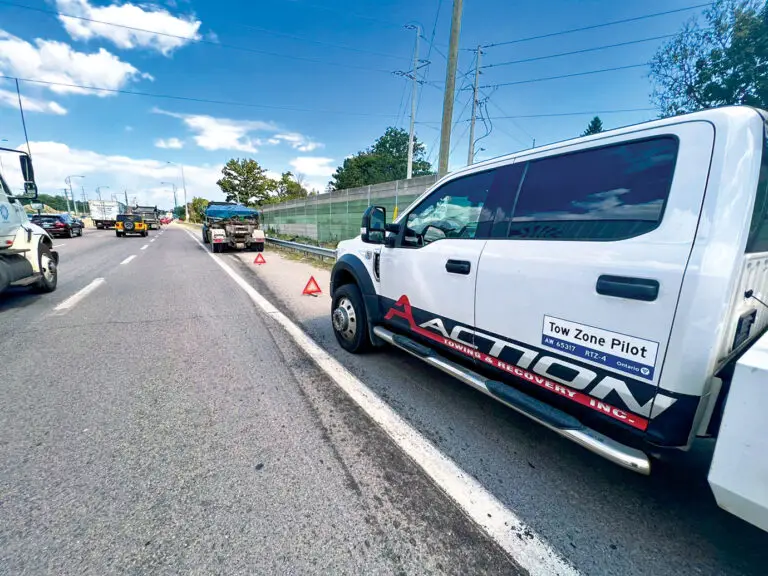
TC: How does this program benefit the public, the towing community, and the MTO?
ED: To ensure highway safety, it is important that the towing companies operating on high-speed provincial highways are properly trained and equipped to perform towing and recovery services in the safest manner possible, ensuring the safety of their staff, customers, and other drivers. The TZP has four main objectives:
- Enhance public safety and reduce clearance times on some of the busiest highways in North America by ensuring that each Towing Services Provider (TSP) has the required training, experience, and is properly equipped and integrated with other public service entities responding to an incident.
- Ensure that towing, recovery, and storage services within the Restricted Towing Zones (RTZs) use standard pricing that is consistent with industry benchmarks.
- Eliminate the unsafe practice of racing to the scene of incidents within the RTZs.
- Provide data and information to support the development of standards, processes, and practices, and inform the development of regulations for the towing and storage sector.
Each of these four principles benefits the public, the towing industry, partners such as the OPP, stakeholders such as insurance companies, and the province.
TC: Have there been any drawbacks to implementing the program?
ED: No, the pilot has brought positive change in all areas identified by us as the objectives of the pilot. It is noteworthy that several other jurisdictions including Quebec recognize the benefits and have similar programs in place. Similar to Ontario, the primary goal is to ensure public safety, customer protection, and faster and safer clearance on high-speed freeways.
Our partners and stakeholders such as the OPP, Insurance Bureau of Canada (IBC), and the Ontario Trucking Association have been very supportive and have positively endorsed the TZP.
Similarly, motorists who have used towing and recovery services have been supportive. To date, customer complaints amount to less than 1% of total number of incidents serviced by the TSPs.
"To date, customer complaints amount to less than 1% of total number of incidents serviced by the TSPs.”
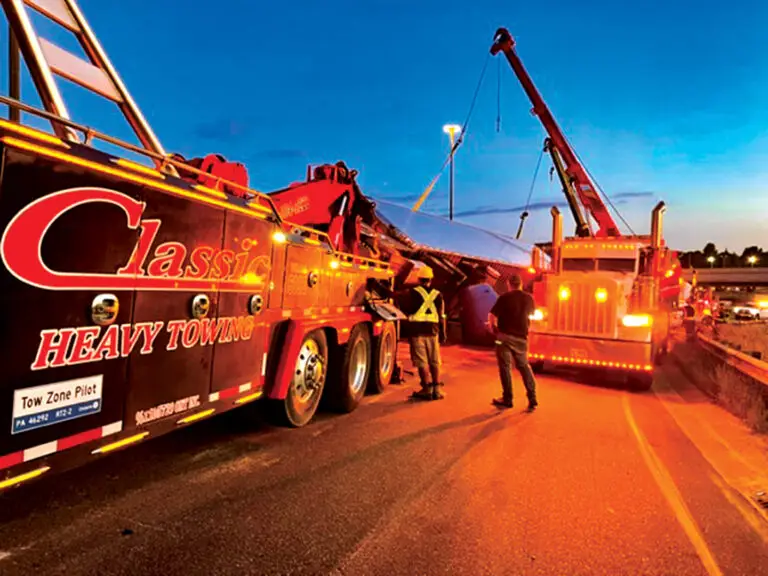
TC: From your point of view, has this program been a success?
ED: Yes, our experience based on the work done so far is that the pilot has either met or exceeded its objectives.
- The TSPs participating in the pilot have been carefully vetted by MTO for proper equipment, experience, and ability to provide towing and recovery services on high-speed freeways in a safe manner. The TSPs have been very responsive and continue to work collaboratively with us to ensure faster and safer clearance.
- The pilot continues to ensure customer protection. The very low number of customer complaints is a strong indicator of success in this area. This is also supported by select audits of services provided and fees charged by the TSPs.
- Within the pilot, we have been able to curb the unsafe practice of racing to the scene of incidents.
- The pilot continues to provide important feedback and data-based input into the broader work related to regulations, standards, and processes for the towing and storage sector.
There are also intangible indicators of success such as the continued strengthening of relationships and trust between MTO, OPP, and the TSPs, leading to better integration of the TSPs during response to incidents.
I do recognize that the pilot is just over a year old, and there is more work to be done as we continue to explore opportunities to further enhance our response to incidents and the delivery of towing and recovery services on some of the busiest freeways in North America.
Next, Tow Canada spoke to Chief Superintendent Rohan Thompson from the OPP’s Highway Safety Division about the program’s roll-out, how it works on the ground, and how the various stakeholders work together.
Chief Superintendent Rohan Thompson, OPP, Highway Safety Division
Tow Canada (TC): How did you get involved with the Tow Zone Pilot (TZP)?
Rohan Thompson (RT): In my role as the chief superintendent of the highway safety division, I am committed to ensuring the safety and security of the people of Ontario on our roadways, waterways, and trails. Part of my portfolio is the oversight of all of the OPP Detachments in the Greater Toronto Area (GTA), and the TZP falls clearly as part of our traffic safety component.
I was part of the government Towing Task Force, so I’ve been involved with these issues for a very long time. I’ve actually spent a lot of my career in traffic. So I’m quite familiar with a lot of the issues that were taking place at the time. I came back into traffic responsibilities in 2020 when all of these issues were coming to a head within the Ontario towing industry.
The government formed the Towing Task Force to examine how to reform towing in Ontario. The towing taskforce released its recommendations in June 2020, and that was in response to the criminal activity (violence, vandalism, fraud, and arson) that was escalating within the towing industry.
TC: So the TZP evolved as one of the recommendations?
RT: The TZP was one of the recommendations that came from the Towing Task Force to deal with criminal activities within the towing industry in light of what we were seeing. It came down to a public safety issue. At the end of the day, tow operators are part of the public, and we want to make sure that we were looking after the safety of the towing industry, the police, the public, and in all the roles that people are involved. We had issues where tow companies were getting into a fight at the scene of a collision because they were all trying to get that business first.
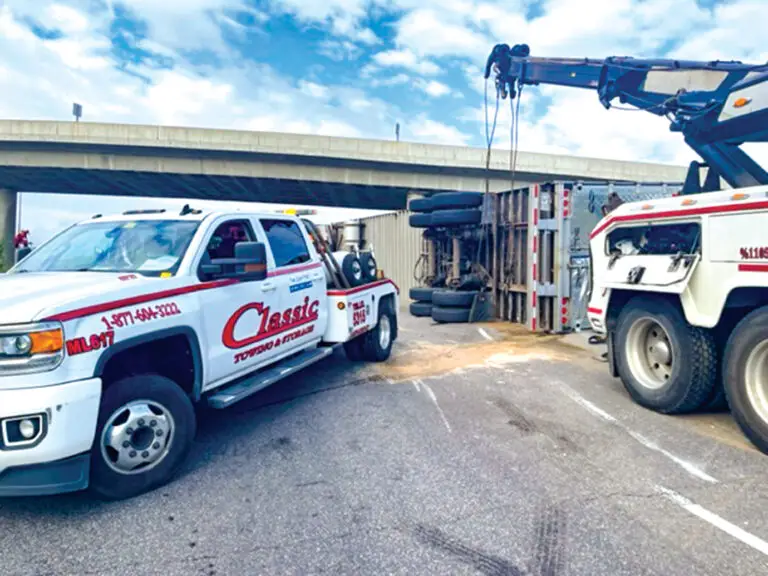
TC: How does the process work, and how does it enhance safety?
RT: The MTO setup restricted towing zones where authorized towing companies have exclusive rights to tow within a geographical area in the GTA. This provides one point of contact for us when the OPP needs a Tow Service Provider (TSP). The officers reach out to OPP dispatch, and they contact the MTO, where the Compass Centre dispatches a pre-determined tow operator. The OPP knows exactly which tow truck is coming and how long they’re going to be.
From the public’s perspective, the MTO has already vetted all these towing companies, so we know who is attending these calls. The public has protection, as we know who is attending the scene, and we know they’ve been vetted. We know where the vehicle was, and we know where it will be towed to if it is necessary to move it to a towing storage area. The public and the OPP also know what fees to expect. The OPP is able to track the vehicle. We know where it is going, and the customer knows where it’s going. And if there’s a complaint, the MTO can follow up quite easily with the towing company, so it’s very easy.
TC: Are there other benefits from an OPP perspective?
RT: There are a number of benefits to the police, the public, and to the community. There’s a real benefit to the police knowing exactly who is going to attend the scene, and that the tow company has been reviewed and selected based on meeting selected operational and safety criteria. It’s beneficial to the customer, as they know exactly who they’re dealing with, and that they are working with a trusted company.
A big part of it, from a public safety perspective, is that we don’t have tow trucks trying to race to a scene, so you really get that larger public safety piece, which I think is critical. And because you don’t have that chasing taking place, you don’t have that competition for business, you don’t have the criminality, the fraud, and all those things that we were really trying to avoid when we came up with the idea for the TZP.
TC: Was/is there anyone unhappy with the program?
RT: I think those who are in it are in it for the right reasons—they see that it is a good program. Those who want things to be the way they were obviously won’t see it quite the same way because now there are rules and there are processes that you have to follow versus a free-for-all. So yes, I think that it was a mixed reaction. However, for the most part, I think even people within the industry were looking for some changes.
I think the industry wants to be seen as more professional. When you have fights on the side of the road over who gets what tow, that’s not going to be received well. I really think they want to be seen as a professional business with proper oversight and vetting. It only adds to public confidence.
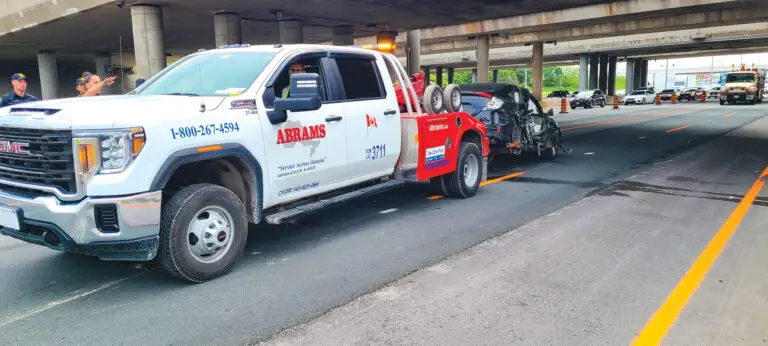
TC: What do you think is important to communicate to the towing community and the public about the TZP from the OPP’s perspective?
RT: The MTO-lead TZP is currently active in the GTA. If you need a tow, the OPP will obviously follow the guidelines that have been set out in the pilot. It is a restricted Tow Zone area, so we have to use the companies that are authorized by the MTO to respond there. That means that when a company arrives on the scene, they will provide the service in that geographical area, and the police officer who is there will also. If there is a police officer there, they will verify that that tow truck that arrives is the tow truck that is supposed to be responding to the scene. It’s not playing favoritism. It is part of a contractual agreement. It is restricted. However, outside the tow pilot, current practice or the assessment practice hasn’t changed.
TC: The TZP has just passed its first anniversary. Would you call it successful?
RT: I think it would be the best thing for everyone to understand that it’s a pilot. So far, it’s positive. It’s the first in Ontario, but it’s not the first. Some areas of the U.S. have a similar program. It may be new to Ontario; however, the TZP is not a completely new phenomenon. For those who are involved in it, it has been working well. The TZP will be evaluated, and the ministries will decide the best course of action to go forward from there. I think it would be challenging to go backwards at this point, based on the public safety improvements we’ve seen on the GTA highways.
After speaking with representatives from the MTO and the OPP, it was finally time for Tow Canada to talk to a couple of the program’s service providers. We asked Joey Gagne, president of Abrams Towing, and Doug Murray, president of A Action Towing and Recovery, to share their experience and what it takes to become a TZP Tow Service Provider (TSP).
Doug Murray, A Action Towing and Recovery & Joey Gagne, Abrams Towing, Towing Service Providers
Tow Canada (TC): From your perspective, what made government intervention necessary?
Doug Murray (DM): Towing was out of control, plagued with excessive billing, corruption, fraud, and violence, all brought into the public eye thanks to the brazen shootings in Toronto as a result of a battle for territory by chasers.
Joey Gagne (JG): There wasn’t really any kind of a system in place in the GTA beyond first-on-scene, first-available. It wasn’t a good system for the consumer, and it wasn’t a good system for the towing industry. It created a lot of conflict, and there was no oversight on who was doing the work, whether they were qualified to do the work, or whether they were credible operators. There were no guarantees. A system where there is accountability and transparency is a huge upgrade from what we have had up until now.
TC: What are the benefits of the program from your perspective?
DM: I am a part of the TZP program and strongly support it—it is a step in the right direction. For the public, towing companies are now accountable, and motorists can now rest assured that they are no longer going to be “pillaged” on the side of the highway.
JG: The benefit to the public is that they get some cost certainty and transparency as to who they are dealing with. The fees are published on the government website, and the fees have been negotiated by the MTO to make sure they are fair. There is a win-win here. The service is being provided by a towing company that is being held accountable by the government, so the consumer has a place to go if there’s a problem, and the towing company that should be doing the tow has someone to answer to. The people who are qualified to do the work are doing the work, not just anybody that decides to buy a tow truck and hasn’t got any experience.
DM: For the towing industry, the TZP is a step forward in making tow truck operators respected as professionals by fellow emergency responders and the public alike. From an owners perspective, it has given me back control of my own business rather than it being in the hands of commission-hungry chasers—finally a contract that is not driven by a price-race to the bottom but based on quality.
The politicians need to see this through. Change takes time. In under a year the relationship between the towers and the OPP has been improved by a new-found respect for towers’ professionalism. It’s a step in the right direction, but if everyone can stick it out, the companies will get stronger in their training and responsiveness, which will further grow the relationship with the police and the public.
TC: What do your colleagues think of the TZP?
DM: Of course there is division. Real towers love it, chasers hate it. There could be an argument that there is no opportunity for the smaller companies, but when it comes to the busiest highways in North America, the towing companies must have a high level of capacity.
JG: I think most of the companies that are aware of it and who understand what’s going on think it is positive. There are some people that don’t like it. I’m sure that if you’re outside of it, maybe you don’t like it, or maybe you’re outside of it because you’re not qualified, right? Maybe you don’t like the accountability. Some of these people may not be happy. But, you know, it’s not really about making the tow industry happy. It is about making the consumer, the MTO, and the general motor public happy.
"It has given me back control of my own business rather than it being in the hands of commission-hungry chasers.”
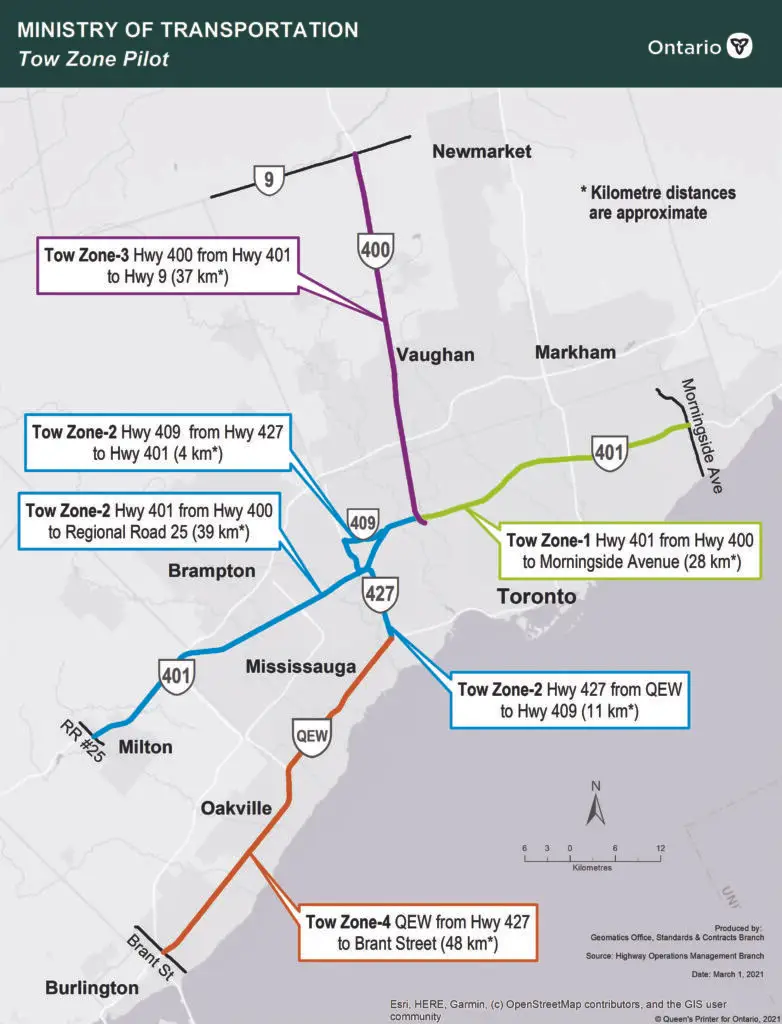
TC: Would you consider this program successful?
JG: I think that there are only positives. There are not really any negatives from what I can tell.
DM: The program is an absolute success thus far, but let’s remember it is a pilot. There is more to come. The pilot will continue to evolve as the industry’s relationship with the police and the public improves. There are many government staff members working behind the scenes on the data and processes to improve the quality of the service.
JG: The pilot project is ongoing, it’s evolving. So the towing companies have all been vetted, and the pricing has been set, but now it’s about the process. What is the best process, and how can we make it better? We are looking for efficiencies all the time. We constantly look for ways to do it better, to advance quality and service, and to improve our ability to clear the road faster and faster. The process is really what we’re practicing, right? We’re constantly working towards improving the processes, the accountability, and the training, and we do a lot of training.
TC: What do you think is important to communicate to the industry about the TZP?
DM: Embrace the change. Things will never go back to the way they were. The days of tow trucks racing to scenes and poaching the public is over. Chasers no longer have control of our industry.
JG: It helps to have accountability from all the stakeholders—the government, the police and law enforcement, and the road managers (MTO). You can have confidence that you’re working with partners rather than what you may have experienced in the past. We feel very much like we’re in partnership with all the stakeholders, and we have very good communications with them. We give feedback, and they take feedback, and we get feedback. So there’s a collaboration of all the parties to provide a better quality of service.
Finally, Brett Weltman, manager, Media Relations, Insurance Bureau of Canada (IBC) was kind enough to respond to Tow Canada’s request for ICB’s perspective of the TZP program. This was his response:
“Overall, the steps the government has taken are making our roads and highways safer for drivers and have put a stop to the dangerous practice of tow-trucking drivers racing each other to crash scenes on 400-series highways in the pilot zone. IBC and its members have long advocated for much-needed reforms to the towing industry and congratulate the government for taking bold action.”
Closing notes
Tow Canada would like to give sincerest thanks to everyone who agreed to participate in an interview or submit a statement for this article.
Tow Canada is fully aware that the TZP is bringing change to the towing industry in Ontario. Government intervention and regulation in any industry can be difficult, controversial, and often unwelcome for various reasons. In Parts I and Part II of this article, we have traced the events that led up to the need for intervention in the towing industry in Ontario, and a solution that has evolved as a consequence (The TZP). Obviously, the story does not end there, and there is room for other perspectives. It is a new program, and no doubt there is room for improvement. If you have a constructive, insightful perspective on program, or other solutions to offer, send a letter to Tow Canada at publish@ara.bc.ca. Anonymous responses will not be considered for print.
For more information about the TZP, visit Tow zone pilot program | ontario.ca. For questions, comments, or complaints about the TZP, email: TowZonePilot@ontario.ca or call 1-855-702-8794.
